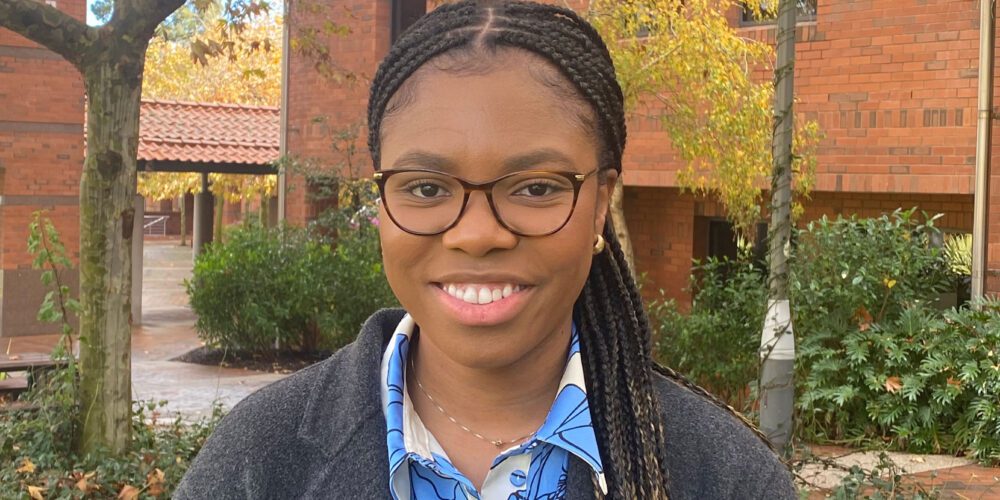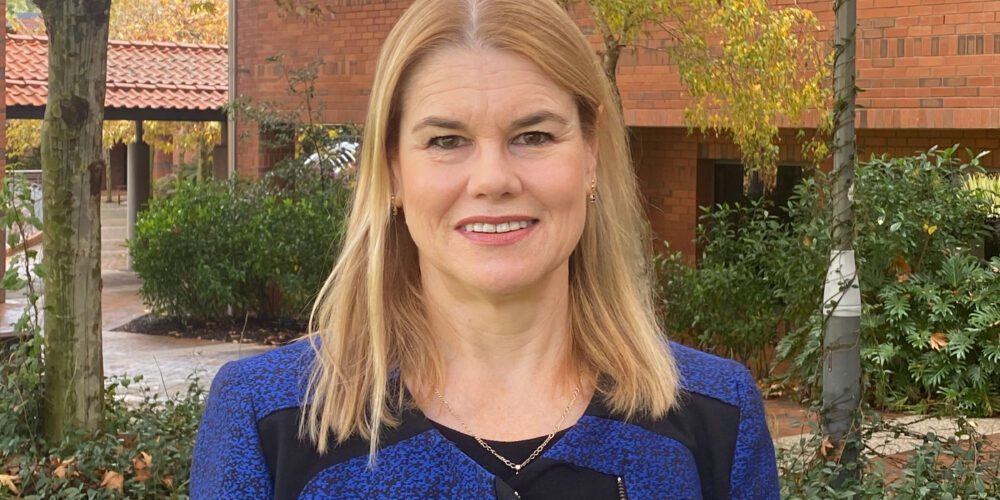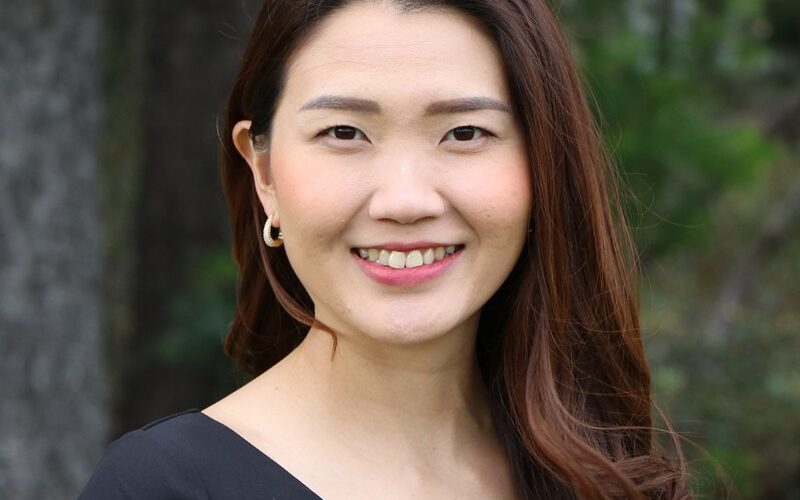While the COVID crisis may have fast tracked the ten-year conversation around introducing electronic prescriptions in medicine, Ayomide’s PhD research is pushing for the proactive improvement of technology in pharmacy practice.
Ayomide (Mide) Ogundipe is completing a PhD in the Curtin Medical School, co-supervised by Curtin’s Professor Lynne Emmerton and Dr Fei Sim. Mide and Lynne reflect on the state of technology in pharmacy practice, what the research hopes to achieve and the highlights of completing a thesis by publication.
Mide:
I finished my undergrad in pharmacy at Curtin in 2017, got registered as a pharmacist in 2018, and then was deciding whether to continue with further study. I was looking at a few options and the thing that really attracted me to Curtin was the research component of postgraduate study. I was talking to my mentor and now co-supervisor, Dr Fei Sim, and she said: ‘Oh, do you think you’d want to do research at Curtin again, and come back and work with me on something?’
Fei had identified that Lynne was an expert in pharmacy practice research and had a lot of experience in technology with previous projects as well, and so that’s how the fit came to be. I started off in the Master of Philosophy and then converted to PhD.
My research is looking to evaluate the technological needs of community pharmacists to enable practice. I’m trying to find ways technology can improve so it’s more user-friendly and allows pharmacists to spend more time with patients and help them with their medication needs.
When I say technology, I’m referring to the things that we use to record and supply medications. For example, My Health Record, and the technology we use to inform our decision-making, such as guidelines and resources. But I’m also looking at some of the more practical things like phones and emails, and trying to answer the question of: why are we still faxing in 2023?
I want to empower the next generation of pharmacists coming through to be more digitally savvy, but also make sure they have technology that supports them to do their job well.
I’m hoping to start the conversation around technology usability studies, but specifically for pharmacists. There’s a lot of research out there for consumers, patients, doctors, nurses – almost everybody else except for pharmacists – and I’m really trying to make a case for why technology is important and how it can improve our ability to be able to do our jobs, do them safely, make decisions and collaborate with other health professionals as well.
I’m quite involved in policy and advocacy for the Pharmaceutical Society of Australia, and I’m Vice-President for the State Branch Committee. Entering the research experience journey and still working in community pharmacy was beneficial because it was nice to have a foot in the door, work through the pandemic and still feel like I had a finger on the pulse of what was happening in practice.
The biggest challenge of my PhD so far was converting from a Master to a PhD, and navigating that process. At the beginning of the research, I wanted to convert and it was just trying to figure out when that would happen. I was trying to balance work with the research and not feel burnt out, while simultaneously navigating a lot of the changes that were happening with enrolment and the requirement to do an internship.
COVID hasn’t negatively impacted the work. If anything, it’s made it more significant because having the lockdowns and restrictions meant that a lot of things had to be provided either virtually or remotely. For example, the introduction of electronic prescriptions: that was something that had been a conversation piece for almost a decade, and COVID fast-tracked this. I find that a lot of the reasons why technology is fast-tracked is because of crisis, and there’s probably a bit of a case to say we should have a proactive approach rather than a reactive approach to these things.
I’m doing a thesis by publication. I’ve had three articles published this year and we’re about to submit another one now, so that’s been exciting. Another highlight is that I was recently awarded Early-Career Pharmacist of the Year from the Pharmaceutical Society, so I’m very honoured.
Throughout the PhD, I’ve not felt like a student. I felt like a collaborator with Lynne and Fei, and having regular meetings has been good. Things can get quite busy with work and other commitments, but I’ve never felt like they’re too busy to catch up with me for an hour.
At the end of the day, your research experience, whether you’re doing a Master of Research or a PhD, you’re using that time to train, develop and build your own skills. Leaning into that and leaning into the expertise and mentorship of your supervisors is one thing, but also being able to manage that project and work is another thing too.
Lynne:
I heard of Mide through her profile. She was Pharmacy Intern of the Year in 2019, with a national profile, and I thought it was an honour to be presented with this potential student through our colleague, Fei, to be able to work with and mentor.
My style of supervising has morphed over the years, and it depends on the student. Mide doesn’t need any prompting; she’s very energetic, proactive and we bounce things around. I’ve had a student who was more quiet and almost reluctant to submit drafts, with the fear of getting slashed, diced and over-edited. But at a point, you just have to submit and take the feedback.
Fei and I are both busy academics, but we tend to work out who’s going to edit first. It’s quite equitable in terms of the workload and our styles are quite complementary. We’re editing a manuscript now, and we had to slice off a few hundred words. Between the three of us, we got there and we’re just about to submit that now. The bottom line is: it depends on the student and you have to adapt to their needs and style.
One thing I’ve never done is set up a written contract with students at the start of the project. It is recommended, but I’ve just never done it. I tell the student: ‘this is what you can expect of me and this is what I expect of you’. But I guess it happens organically, doesn’t it? You have your meetings, and you figure out what works and the best way to communicate with each other. Importantly, you have to have honest communication if things aren’t working.
Mide keeps me young. It’s a modern way of working. I feel Mide’s energy, positivity, youth and vibrancy. That’s what I get out of it.

Ayomide Ogundipe
Mide is a multi-award-winning young pharmacist, PhD student and part-time teacher at Curtin Medical School. Her research is discovering how technology can help pharmacists manage patients’ medicines and provide better services. This will help patients stay safe with their medicines, ensure they get the medicines they need and help pharmacists make the best decisions in collaboration with the patient’s healthcare team. Mide is highly motivated and passionate about research, sharing her work with other researchers and pharmacists. She is also keen to inspire the next generation of pharmacists through her teaching.

Professor Lynne Emmerton
Lynne Emmerton is the Interim Dean of the Curtin Medical School, which encompasses the disciplines of Medicine, Pharmacy, Laboratory Medicine, Biomedical Sciences, and Medical Radiation Science. Also at Curtin University, she has held school leadership roles as Deputy Head, Director of Learning and Teaching, Director of Graduate Research, and coordinator of three postgraduate degree programs. She has over three decades of experience in Pharmacy Practice research, in fields such as specialist services, health technologies, and health literacy and consumer behaviour.

Dr Fei Sim
Fei Sim is a Senior Lecturer and the Coordinator of International Engagement in the Curtin Medical School at Curtin University. Fei is the National President and Chair of the Pharmaceutical Society of Australia Board, the first female, and the first from a diverse cultural background to be elected to this position since its Federation in 1977. Fei is the current Chair of the Australian Pharmacy Leaders Forum, an independent coalition of senior decision-makers from national pharmacy organisations who work together on issues of national importance to the pharmacy profession and the public. She is an appointed member of the Federal Government’s National Women’s Health Advisory Council of the Women’s Health and Equity Section (Primary and Community Care Group), and serves as a Co-Chair of the Access, Care and Outcomes Sub-Committee of this Council. Fei is committed to patient care, learning and teaching, leadership in pharmacy, research in innovation and initiative in pharmacy service delivery, as well as peer and professional engagement.



